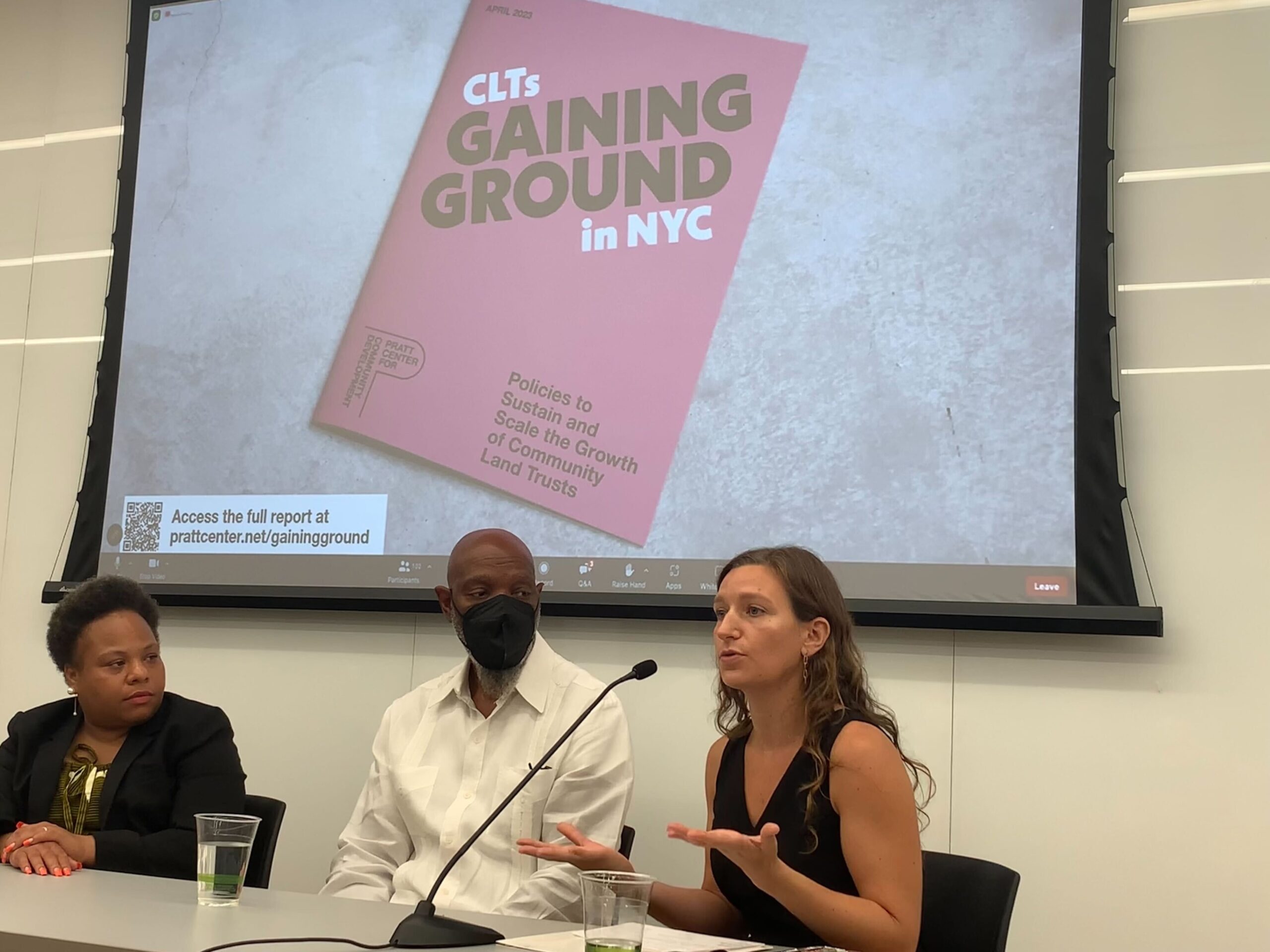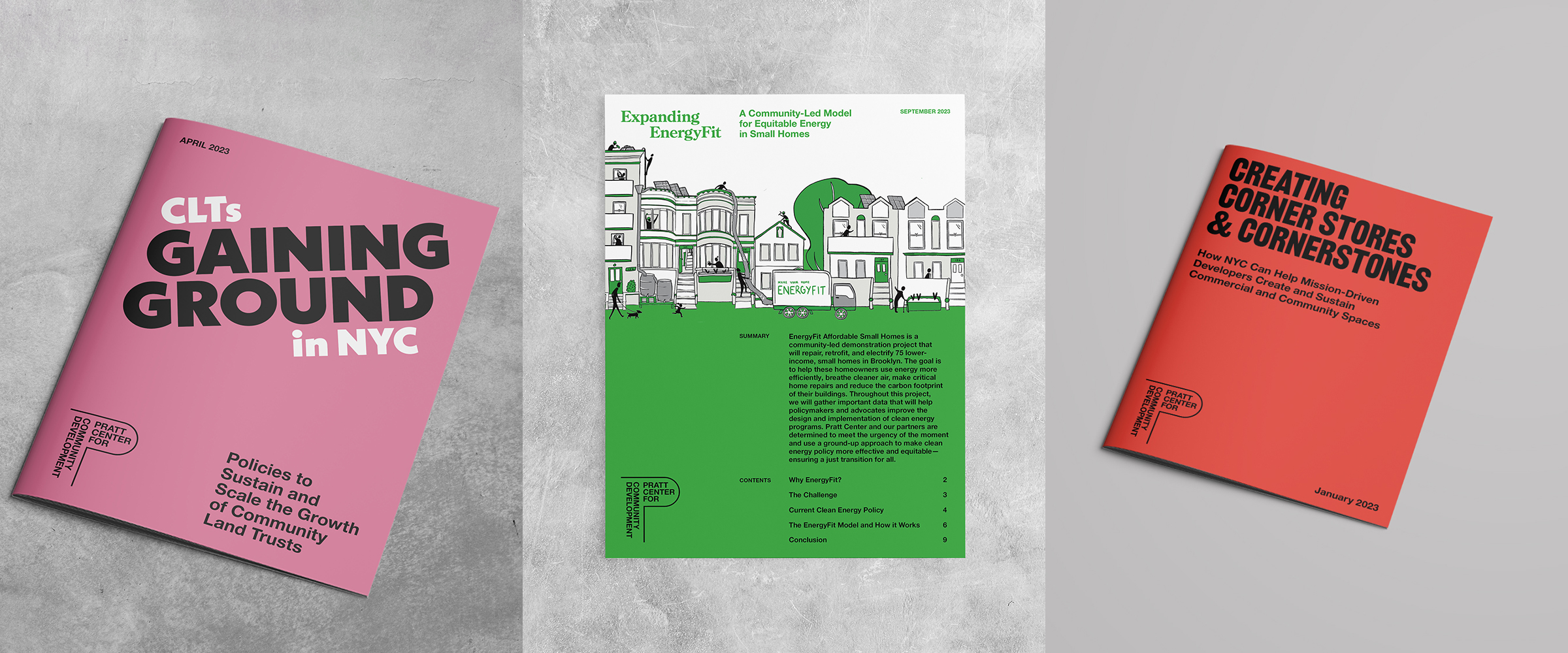The Pratt Center for Community Development draws on its sixty years of research and advocacy to work with community-based organizations on solutions to complex structural problems across New York City. With its dedicated staff of planners and program managers, Pratt Center tackles systemic inequities at a local scale, prioritizing the concerns of community members every step of the way.
Its work centers on the issues everyday New Yorkers care about the most, from safe and affordable housing to combating climate change through clean energy access and neighborhood sustainability. Their work has a particular focus on low-income and BIPOC communities that have been historically excluded from city planning decision-making and resources in the city. As part of its mission, the Pratt Center publishes research reports that provide new data analyses and policy recommendations to ensure that all communities have a say in how we solve New York City’s environmental, racial, and economic inequities. Because the research stems from actual needs identified by community groups, Pratt Center’s reports become deployable tools that carry the weight of an institution of higher learning, and help advance advocacy efforts, sometimes over a period of several years.
From supporting the expansion of community land trusts to expanding local models of retail, five recent reports from the Pratt Center illustrate the community-led nature of its work:
Keeping New Yorkers in Their Homes
The COVID-19 pandemic placed a spotlight on the precarious position of renters in New York and across the country. But eviction rates were high even before the pandemic, disproportionately affecting low-income tenants, and continue to destabilize families and communities today. The Right to Remain series of policy briefs, co-authored with Community Service Society of New York, make the case that Good Cause Eviction legislation, which prevents no-fault evictions, should be enacted broadly to help keep New Yorkers in their homes. The reports also highlight the racial disparities in eviction rates—Black households are three times as likely to face eviction than white households in New York—and challenge common misconceptions about the effects of tenant protections on housing supply.
Protecting Tenants in Basement Apartments
After the intense flooding caused by Hurricane Ida in 2021, which claimed the lives of eleven New Yorkers living in basement dwellings, the Pratt Center issued an update to its 2008 report on the prevalence of these unaccounted-for basement apartments in the city’s low-income communities, further advocating for policy changes to make such units safe and habitable. The Center’s report recommended decriminalizing basement apartments, revising building and zoning codes to address the threat of flooding, and funding programs that update and regulate basement units. As a result of Pratt Center’s advocacy with partners in the BASE coalition (Basement Apartments Safe for Everyone), basement legalization gained momentum at the city and state levels.
In 2023, the New York governor included basement apartment safety legislation, based on BASE’s proposals, in her statewide housing plan and executive budget, and a similar bill is under consideration in the State Senate and Assembly. Basement legalization is also included as a priority in the Mayor’s Housing Blueprint, as reflected in his administration’s Albany agenda and current City of Yes zoning initiatives at the Department of City Planning. In addition to the report, Pratt Center has written and delivered testimony to City Council and the State legislature, created memos and legislative briefing materials, and met with policymakers to present our research and analysis of policy to create a basement legalization program.
To make this complicated policy issue understandable and compelling to the public, Pratt Center published a blog analyzing commonly heard arguments against basement legalization, and spoke with news outlets including NPR, The New York Times, Gothamist, Bloomberg, Curbed, Pix11, and co-authored Op-Eds in outlets including City & State.
Expanding Clean Energy for All
New Yorkers pay significantly more for energy than the rest of the country, and this cost burden falls disproportionately on low-income families. Across the five boroughs, these low-income households who reside in older buildings are also more likely to have home repair needs that pose serious health risks, from poorly maintained gas-powered appliances and ventilation systems to untreated lead, asbestos, and mold.
The Pratt Center’s EnergyFit initiative, which started as a pilot program with city funding in 2015, provides a free repair, retrofit, and electrification-readiness package to income-eligible households. The community-led, ground-up model empowers homeowners to transition to clean energy through a streamlined and accessible application process.
Unlocking the Potential of Community Land Trusts

The Pratt Center’s 2023 report on community land trusts (CLTs)—democratic nonprofit organizations that remove land from the for-profit market and steward it for the benefit of the community—finds that these trusts are a vital tool for ensuring long-term affordability for people and small businesses. Most of the city’s twenty existing CLTs were formed in the past decade, and the recent push for CLTs reflects the rising rents faced by low-income tenants and homeowners, small businesses, and community spaces.
CLTs encounter challenges in securing land and financing. The Pratt Center’s policy recommendations include enacting legislation that directs land to CLTs, providing funding for CLT organizational development, and integrating CLTs into the city’s existing land-use plans. And next year, an initiative funded by one of the Pratt Center’s Taconic Fellowships, which support community-based projects led by teams Pratt faculty and students, will lay the groundwork for a CLT in Flatbush, a Brooklyn neighborhood whose high rate of Black homeownership is threatened by speculation.
Removing Roadblocks for Mission-driven Developers
The Pratt Center’s Creating Corner Stores and Cornerstones report explores the challenges nonprofit and mission-driven developers face in leasing commercial spaces to small businesses and community groups. Without mechanisms to stem sharp rent increases, commercial tenants face instability, and economic conditions have decreased revenue for many small businesses and nonprofits. Examining successful models from across the country, the report proposes ways to support those businesses and organizations that seek to rent space in affordable housing developments; expand community-based ownership models; and acquire more robust commercial real estate data to identify chronically vacant properties and struggling businesses that need assistance.
